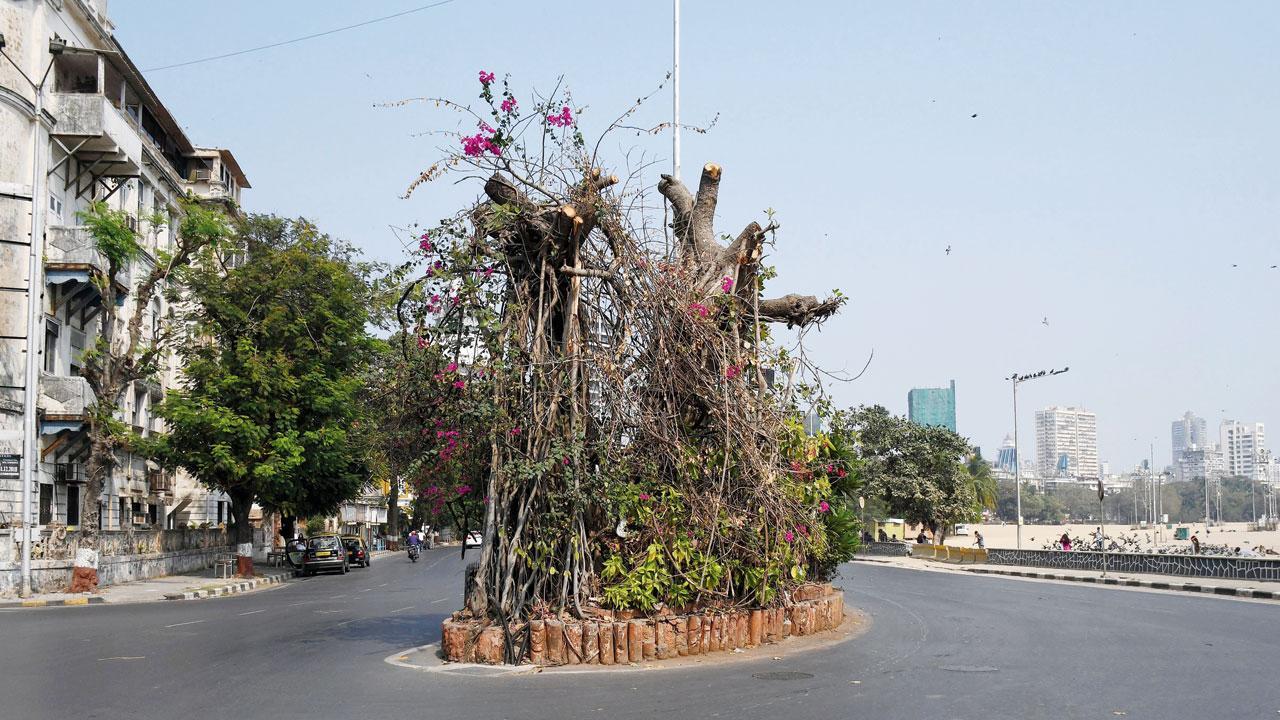As chopping of a massive banyan in Girgaum creates uproar in city, tree experts and green activists say law is only for catching miscreants, not preventing hacking

Arborist Vaibhav Raje says the banyan tree at Girgaum could have been saved had it been trimmed scientifically and systematically. Now, its health remains a wait-and-watch situation. Pic/Ashish Raje
Mumbai: Girgaum tree could have been saved, says city arboristRecently, a majestic banyan tree in Girgaum was hacked, allegedly to clear the view for commercial hoardings. The police arrested four persons in connection with the crime and registered a non-cognisable case under relevant sections of the Maharashtra Preservation of Trees Act, 1971. Promising strict action, Maharashtra Tourism minister Aaditya Thackeray tweeted, “This was one of our most beautiful spots in that vicinity... the culprits won’t be spared, whoever it is.” The BMC has now decided to revoke the licenses of two advertising companies that had allegedly deployed men to hack the tree.
ADVERTISEMENT
Vaibhav Raje, arborist
The city is no stranger to trees being brutally felled under the pretext of trimming, or for commercial purposes. According to reports, only 13 per cent of space-strapped Mumbai has green cover. Vaibhav Raje, arborist and partner at Treecotech LLP, was asked to inspect the site at Girgaum to see if the tree could be salvaged. “The tree (ficus benghalensis) would have been around 50 years old. Had it been pruned scientifically, there wouldn’t have been any cause for concern. But, from the looks of it, it seems that it was topped and amputated, leaving a bare stump behind.” He says, regardless of what species or size the tree is, topping—the indiscriminate cutting of tree branches to stubs or to lateral branches that are not large enough to assume the terminal role- is highly detrimental to the health and longevity of a tree.
“Although the banyan tree species is quite abundant in Mumbai and is resilient, this does not justify the mistreatment it has received.” With all its canopy cover now gone, the tree has been exposed to further urban environmental stresses, making it even more challenging for it to cope. “Additionally, the tree is located on a narrow median at a busy junction, making it difficult for any root zone treatment due to all the compaction around it. Any cosmetic treatment may not be that effective, given the size and condition of the tree.” He says that the only way out is to allow the tree to take its natural course and hope that it springs back to life, but to expect it to regain its former glory anytime soon may not be possible.
Environment activist Zoru Bhathena
According to the Maharashtra (Urban Areas) [protection and preservation] of Trees Act, 1975, two new saplings have to be planted within 30 days of a tree being felled, or the time given by the tree officer. The original tree can also be transplanted. Additionally, a deposit of at least Rs 4,000 has to be made for each tree that is being felled.
Environment activist Zoru Bhathena says the tree protection laws are fairly decent on paper. There are processes and provisions for everything, whether it is trimming of branches or transplantation of trees. “The system, therefore, is in place. The problem lies in implementation. Let’s say, you cut 10,000 trees because they were coming in the way of a development project, where are the 20,000 new saplings that you were supposed to plant for felling those? The system is so unmotivated that they themselves don’t follow it.”
Raje says that while laws for tree protection are stringent, they seem to be effective and applicable only if one is caught in the wrong-doing, which is not helpful if the damage is already done. At present, as per section 21 of the Maharashtra Preservation of Trees Act, 1971, the punishment for cutting trees is a fine of Rs 1,000 to Rs 5,000 and imprisonment ranging from one week to a year. “Even if they make arrests in the case, it’s normally the junior most guy who might have got Rs 1,000 to cut the tree, who will be arrested. The mastermind goes away scot-free, which is the case with most things.”
Raje believes what we lack in terms of tree laws is the finer underlying policies, standardisation of tree management and safe operating procedures. “For instance, tree pruning should cover an initial tree risk assessment, followed by specific technical recommendations and involvement of qualified, competent tree care experts who understand the subject to execute the same. With changing times, it is imperative for mega cities to upgrade their tree management regime to international standards with the help of professional arboriculture experts like us.”
 Subscribe today by clicking the link and stay updated with the latest news!" Click here!
Subscribe today by clicking the link and stay updated with the latest news!" Click here!






